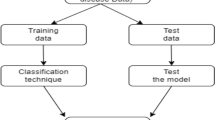Abstract
Today the most significant public health problem is Heart Failure (HF). There are a lot of raw medical data available to healthcare organizations in the form of structured and unstructured datasets, but the need is to analyze this data to get information and to make intelligent decisions. By using data mining, classification tool on a real dataset of cardiac patients we propose a model which classified these patients into four major classes. This model will help to identify the risk of HF and patients who have no HF signs but structural irregularities. We can also identify the patients having HF signs and irregularities and those having the critical stage of HF. This paper provides a detailed summary of modern strategies for management and analysis of HF patients by classes (1 to 4) that have appeared in the past few years.
Access this chapter
Tax calculation will be finalised at checkout
Purchases are for personal use only
Similar content being viewed by others
References
McCullough, P.A., Philbin, E.F., Spertus, J.A.: Confirmation of a heart failure epidemic: findings from the resource utilization among congestive heart failure (REACH) study. JACC 39, 60–69 (2002)
McMurray, J.J., Adamopoulos, S., Anker, S.D.: ESC guidelines for the diagnosis and treatment of acute and chronic heart failure 2012: the task force for the diagnosis and treatment of acute and chronic heart failure 2012 of the European society of cardiology. EURJHF 14, 803–869 (2012)
Ouwerkerk, W., Adriaan, A.V., Zwinderman, A.H.: Factors influencing the predictive power of models for predicting mortality and/or heart failure hospitalization in patients with heart failure. JACC. Heart Fail 2, 429–436 (2014)
Gerber, Y., Weston, S.A., Redfiled, M.M., Chamberlain, A.M., Manemann, S.M., Killian, J.M., Roger, V.L.: A contemporary appraisal of the heart failure epidemic in Olmsted county, Minnesota, 2000 to 2010. JAMA Intern. Med. 175, 996 (2015)
Tan, G., Cbye, H.: Data mining applications in healthcare. J. Healthcare Inf. Manage. 19, 64 (2004)
Giudici, P.: Applied Data Mining: Statistical Methods for Business and Industry. Wiley, New York (2003)
Taslimitehrani, V., Dong, G.: Developing EHR-driven heart failure risk prediction models using CPXR (Log) with the probabilistic loss function. J. Biomed. Inform. 60, 260–269 (2016)
Cios, K.J., Moore, G.W.: Uniqueness of medical data mining. Intell Med. 26, 1–24 (2002)
Health World Organization: The top 10 causes of death. http://www.who.int/mediacentre/factsheets/fs310/en/index.html
Wei, Y., Liu, T., Valdez, R., Gwinn, M., Khoury, M.J.: Application of support vector machine modeling for prediction of common diseases: the case of diabetes and pre-diabetes. BMC Med. Inform. Decis. Mak. 10, 16 (2010)
Kennedy, R.E., Livingston, L., Riddick, A., Marwitz, J.H., Kreutzer, J.S., Zasler, N.D.: Evaluation of the neurobehavioral functioning inventory as a depression screening tool after traumatic brain injury. Jorn. Head Trauma Rehab. 20, 512–526 (2005)
Wu, J., Roy, J., Stewart, W.F.: Prediction modeling using EHR data: challenges, strategies, and a comparison of machine learning approaches. Med. Care 48, 106–113 (2010)
Kumari, M., Godara, S.: Comparative study of data mining classification methods in cardiovascular disease prediction. IJCST 2 (2009)
Kwon, K., Hwang, H., Kang, H., Woo, K.G., Shim, K.: A remote cardiac monitoring system for preventive care. In: Proceedings of ICCE, pp. 197–200. IEEE (2013)
Kurt, I., Ture, M., Kurum, A.T.: Comparing performances of logistic regression, classification and regression tree, and neural networks for predicting coronary artery disease. Expert Syst. Appl. 34, 366–374 (2008)
Zupan, B., Demsar, J., Kattan, M.W., Beck, J.R., Bratko, I.: Machine learning for survival analysis: a case study on recurrence of prostate cancer. Artif. Intell. Med. 20, 59–75 (2000)
Panahiazar, M., Taslimitehrani, V., Pereira, N., Pathak, J.: Using EHRs and machine learning for heart failure survival analysis. Study Health Technol. Inform. Med. 216, 40–44 (2015)
Deekshatulu, B.L., Chandra, P.: Classification of heart disease using artificial neural network and feature subset selection. Global J. Comput. Sci. Technol. 13 (2013)
Fürnkranz, J.: Round Robin classification. J. Mac. Learn. Res. 2, 721–747 (2002)
http://www.ncsu.edu/labwrite/Experimental%20Design/accuracyprecision.htm
Hong, J., Kim, S., Zhang, B.: AptaCDSS-E: a classifier ensemble-based clinical decision support system for cardiovascular disease level prediction. Expert Syst. Appl. 34, 2465 (2008)
Awang, R., Palaniappan, S.: Intelligent heart disease predication system using data mining technique. Int. J. Comput. Sci. Netw. Secur. 8 (2008)
Patil, S., Kumaraswamy, Y.: Intelligent and effective heart attack prediction system using data mining and artificial neural network. Eur. J. Sci. Res. 31 (2009)
Author information
Authors and Affiliations
Corresponding author
Editor information
Editors and Affiliations
Rights and permissions
Copyright information
© 2016 ICST Institute for Computer Sciences, Social Informatics and Telecommunications Engineering
About this paper
Cite this paper
Saqlain, M., Liaqat, R.M., Saqib, N.A., Hameed, M. (2016). A Classification Model for Predicting Heart Failure in Cardiac Patients. In: Ahmed, M., Begum, S., Raad, W. (eds) Internet of Things Technologies for HealthCare. HealthyIoT 2016. Lecture Notes of the Institute for Computer Sciences, Social Informatics and Telecommunications Engineering, vol 187. Springer, Cham. https://doi.org/10.1007/978-3-319-51234-1_6
Download citation
DOI: https://doi.org/10.1007/978-3-319-51234-1_6
Published:
Publisher Name: Springer, Cham
Print ISBN: 978-3-319-51233-4
Online ISBN: 978-3-319-51234-1
eBook Packages: Computer ScienceComputer Science (R0)




